|
|
|
Sort Order |
|
|
|
Items / Page
|
|
|
|
|
|
|
| Srl | Item |
| 1 |
ID:
112390
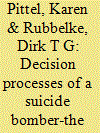

|
|
|
|
|
| Publication |
2012.
|
| Summary/Abstract |
This paper provides a theoretical analysis of suicide attacks and defection. First, decision processes of potential attackers are examined from an economist's perspective. The results are then applied to insights from behavioural economics and psychology. We derive conditions under which agents decide to become suicide bombers-or to announce an attack and defect later. Taking account of hyperbolic discounting we show why the decision to commit a suicide attack can be time-inconsistent and what internal manipulation mechanisms (arising from cognitive dissonance and terror management) and external manipulation mechanisms (employed by terrorist organizations and governments) might prevent or foster time-inconsistency.
|
|
|
|
|
|
|
|
|
|
|
|
|
|
|
|
| 2 |
ID:
163191
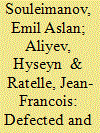

|
|
|
|
|
| Summary/Abstract |
Can former insurgents in the service of counterinsurgent paramilitaries be considered a perfectly loyal force? What mechanisms may help to deter subsequent defections of individuals who have already “betrayed” once? Drawing on a unique set of primary data, this article examines the effective counter-defection practices of Chechnya’s pro-Moscow paramilitaries toward prospective defectors from among ex-insurgents. It explores three interwoven mechanisms employed with various intensities to avert “double defections” at the peak of the locally fought counterinsurgency in Chechnya from 2000 to 2005. These mechanisms are: a) extrajudicial executions of recidivists and their relatives, b) initiation violence targeting insurgents’ relatives, and c) disclosure of the identities of defected insurgents who were responsible for killing insurgents in combat to the families of slain insurgents.
|
|
|
|
|
|
|
|
|
|
|
|
|
|
|
|
| 3 |
ID:
102639
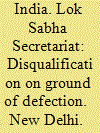

|
|
|
|
|
| Publication |
New Delhi, Lok Sabha Secretariat, 2009.
|
| Description |
12p.
|
| Series |
Parliamentary procedure abstract series; 33
|
|
|
|
|
|
|
|
|
|
|
|
Copies: C:1/I:0,R:1,Q:0
Circulation
| Accession# | Call# | Current Location | Status | Policy | Location |
| 055716 | 328.404/IND 055716 | Main | On Shelf | Reference books | |
|
|
|
|
| 4 |
ID:
156909
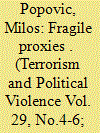

|
|
|
|
|
| Summary/Abstract |
Foreign governments frequently intervene in armed conflicts by sponsoring rebels against their adversaries. A sponsorship is less costly than a direct military intervention, but rebels often defy orders, desert fighting, or turn guns against their sponsors. Under what conditions do rebels defect against their sponsors? Drawing on organizational theory, I argue that as rebel organizations become less centralized and formalized, the rebels are likely to defect against their sponsors. This occurs because non-centralized organizations have weak central leadership and allow for dispersed decision-making, both of which narrow the manipulative capacity of sponsors. Due to these disadvantages, non-centralized rebel movements are less accountable to their sponsors, cannot credibly commit to rapidly change their policies in response to changes in the sponsor’s demands, and suffer from frequent and destructive quarrels between the top and lower echelons. Using multilevel logistic models for panel data, I test my argument on a novel dataset. My quantitative analysis shows that rebel structure is a robust predictor of defection.
|
|
|
|
|
|
|
|
|
|
|
|
|
|
|
|
| 5 |
ID:
173134
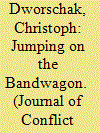

|
|
|
|
|
| Summary/Abstract |
When confronted with mass uprisings, governments deploy their security forces for crowd control or repression. However, sometimes security agencies choose to side with the opposition movement. Recent work shows that “fragmentation” contributes to defection: fragmenting the security forces into parallel units leads to oversight problems and grievances among soldiers, which raises the risk of members of the security forces defecting to the opposition movement. However, I argue that the effect on defection is strongly moderated by the circumstances under which states choose to fragment their military: fragmentation for the purpose of security specialization, called “differentiation,” even decreases its risk. Employing Bayesian multilevel modeling, the findings corroborate this distinction. The study contributes to the fundamental discussion on civil–military relations, shedding light on why some conflict situations see security defections while others do not. Understanding this phenomenon is a pivotal element to explaining how conflicts develop, escalate, and end.
|
|
|
|
|
|
|
|
|
|
|
|
|
|
|
|
| 6 |
ID:
191068


|
|
|
|
|
| Summary/Abstract |
Why do people leave the world’s largest far-right organisation? In this article, we analyse six autobiographical defection accounts of ex-members of the Rashtriya Swayamsevak Sangh (RSS), the apex organisation of the Indian Hindu nationalist movement. Compiled here for the first time, an analysis of these accounts reveals that even the most disciplined and ideologically coherent far-right organisations suffer from internal organisational messiness and attrition. These accounts challenge the unique mythology that surrounds the RSS and gesture towards the methodological possibilities of discarding the ideology-driven analyses of the far right in favour of material analyses of the lives of far-right organisational members.
|
|
|
|
|
|
|
|
|
|
|
|
|
|
|
|
| 7 |
ID:
141294
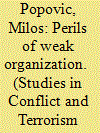

|
|
|
|
|
| Summary/Abstract |
Why do some militant groups defect against their sponsors, while others remain loyal? Pakistan's sponsorship of Jaish-e-Mohammad and Lashkar-e-Taiba offers a controlled case comparison as the former turned its guns against Islamabad, while the latter remained obedient despite a similar strength, ethnic ties to the regime, and the presence of alternative supporters. What explains Jaish's defection and Lashkar's loyalty? Drawing on organizational and principal-agent theory, I argue that militant organizations that are more decentralized and factionalized are more likely to turn on their sponsors, because their weak command and control as well as dispersed decision making limit the militant leaders' ability to follow through on their commitments to the sponsors and makes it more difficult for the sponsors to discipline the militant organization. When a sponsor attempts to coerce such organizations into submission by detaining militant leaders, freezing or confiscating their material assets the rank-and-file is likely to turn guns against the sponsor.
|
|
|
|
|
|
|
|
|
|
|
|
|
|
|
|
| 8 |
ID:
173196
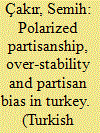

|
|
|
|
|
| Summary/Abstract |
A vast literature demonstrates that partisanship has a stabilizing impact on politics, as it limits electoral volatility. Recent studies have also shown that polarization increases partisanship, thus contributing to electoral stability. Focusing on Turkey, an unconsolidated and highly polarized democracy, this study investigates the role of partisanship in a comparative context by means of data from the Comparative Study of Electoral Systems project. I find that Turkey (among more than 40 countries) is a very high-partisanship country, where partisanship greatly shapes the evaluations of short-term determinants of vote and the vote itself. This research also shows that partisanship in Turkey is associated with very low electoral volatility and defection rates. Moreover, the degree of identification also plays a significant role in its impact on volatility and defection. These findings from the Turkish case offer insights and stimulate a new normative debate on the role of partisanship in unconsolidated democracies.
|
|
|
|
|
|
|
|
|
|
|
|
|
|
|
|
| 9 |
ID:
142644
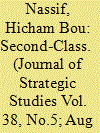

|
|
|
|
|
| Summary/Abstract |
The defection of a significant number of Sunni officers amidst the ongoing turmoil in Syria created a unique opportunity to get access to original data on the Syrian armed forces. This study draws on extensive fieldwork to probe the sectarian question in the Syrian officer corps. On the basis of a series of interviews conducted throughout the summer of 2014, I investigate the politics and consequences of sectarian stacking in the Syrian military as well as the root causes of Sunni officers’ grievances and alienation. My conclusions draw on an original database that compiles the sectarian affiliations of 81 prominent officers who occupied the most senior military positions under Bashar al-Asad.
|
|
|
|
|
|
|
|
|
|
|
|
|
|
|
|
| 10 |
ID:
141181


|
|
|
|
|
| Summary/Abstract |
Anti-insurgent militias and states attempt to erode insurgent groups’ capacities and co-opt insurgent fighters by promising and providing benefits. They do so to create a perception that the insurgency is unraveling and to harness inside information to prosecute more effective counterinsurgency campaigns. Why do some insurgents defect to a paramilitary group and others exit the war by demobilizing, while still others remain loyal to their group? This article presents the first empirical analysis of these questions, connecting insurgents’ motivations for joining, wartime experiences, and organizational behavior with decisions to defect. A survey of ex-combatants in Colombia shows that individuals who joined for ideological reasons are less likely to defect overall but more likely to side-switch or demobilize when their group deviates from its ideological precepts. Among fighters who joined for economic reasons, political indoctrination works to decrease their chances of demobilization and defection to paramilitaries, while opportunities for looting decrease economically motivated combatants’ odds of defection.
|
|
|
|
|
|
|
|
|
|
|
|
|
|
|
|
| 11 |
ID:
166608
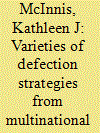

|
|
|
|
|
| Summary/Abstract |
How do states defect from multinational military coalitions? The question deserves considerable academic scrutiny, as states increasingly rely on coalitions to prosecute military missions. Yet to the extent that coalition defection has been explored, the extant literature tends to see defection as a binary undertaking – states are either in or out. In practice, however, defection is an act of risk minimization in a manner that forces other coalition partners to fill resulting operational gaps. A coalition can therefore appear stable due to a constant number of flags associated with the mission, but in practice be much less coherent and capable. After defining defection as a non-routine abrogation of operational responsibility at other coalition partners’ expense, significantly prior to mission conclusion, this article explores several states’ participation in Operation Iraqi Freedom and the various manners by which they defected from that coalition. It concludes with implications for future scholarship.
|
|
|
|
|
|
|
|
|
|
|
|
|
|
|
|
|
|
|
|
|